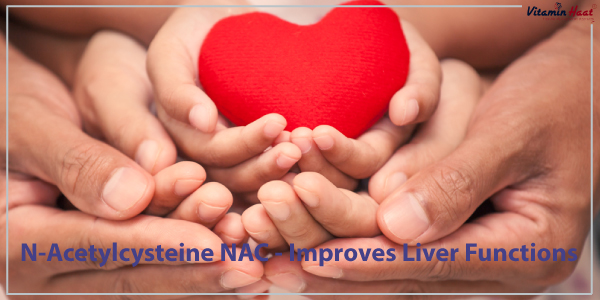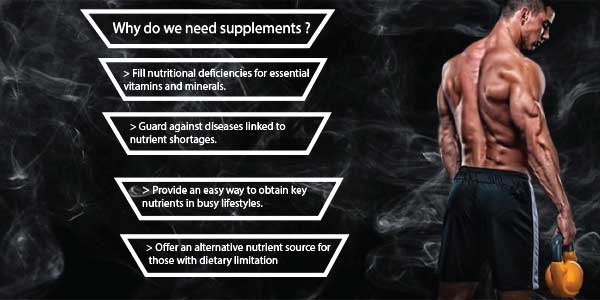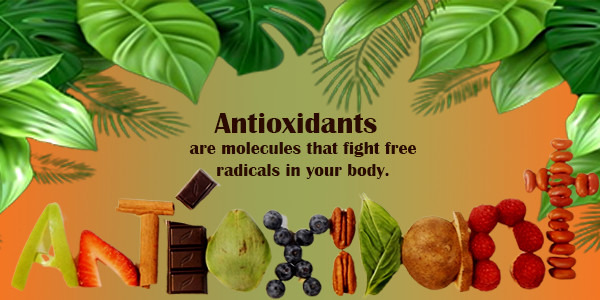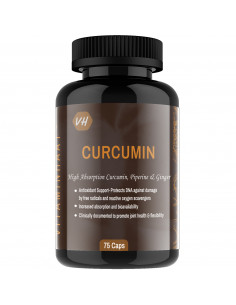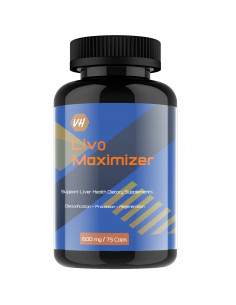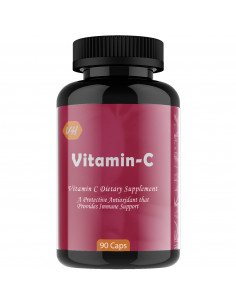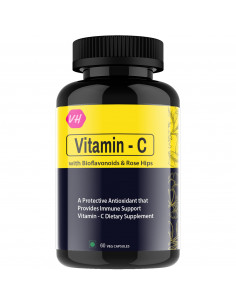- Supplement
- 6 likes
- 4199 views
As the most abundant antioxidant in your body, GSH is responsible for maintaining oxidative balance in each of your cells. Vitaminhaat's Liver Maximizer (NAC) Liver Supplement Supports Liver Health Liver-Health Vitamins, Nutrients and Herbs Supports Liver Detoxification, Protection and Regeneration Activates Alcohol Metabolizing Enzymes Provides Liver Protection Factors.
Taking glutathione as a nootropic supplement does not adequately restore GSH levels in your brain because it can’t cross the blood-brain barrier. This vastly underrated nootropic, NAC easily penetrates the blood-brain barrier and raises glutathione levels in your brain. Vitaminhaat’s Liver Detox contains Milk Thistle, a traditionally used western herb to support liver function and liver health.
NAC has been used to treat acetaminophen poisoning for decades. In USA every year there are 56,000 ER visits from paracetamol overdose, resulting in at least 100 deaths. NAC provides the glutathione our liver needs to fight off the metabolite NAPQI in paracetamol that does severe liver damage.
As a Liver Antioxidant, NAC helps prevent glutamate toxicity, boosts dopamine, and reduces inflammation, oxidative and free radical damage.
Acetylcysteine, also known as N-acetylcysteine (NAC), is a modified amino acid that is used as an antidote for acetaminophen overdose to prevent hepatic injury. Acetylcysteine is a hepatoprotective agent and has not been linked to significant serum enzyme elevations during therapy or to instances of clinically apparent acute liver injury.
Background
Acetylcysteine is a modified amino acid that is used to reverse the toxic effects of acetaminophen overdose and prevent acute liver failure. The amino acid cysteine has a thiol side chain that can undergo redox reactions and thus has antioxidant activity. Importantly, cysteine is required for synthesis of glutathione (a tripeptide of cysteine, glycine and glutamic acid) that is an essential intracellular antioxidant, providing protection against free radicals and other intracellular toxins including intermediates of drug metabolism.
Glutathione can become depleted in patients with malnutrition, chronic debilitating illnesses and chronic alcoholism, and becomes acutely depleted in patients with acetaminophen overdose leading to formation of toxic adducts of acetaminophen metabolites with essential intracellular molecules. Restoration of glutathione stores ameliorates the cell injury from acetaminophen.
In multiple clinical trials, administration of acetylcysteine (also referred to as N-acetylcysteine or NAC) within 10 hours of an acetaminophen overdose effectively prevented serious liver injury. Subsequent studies suggested that administration even after 10 hours was partially effective and may also be beneficial in other, non-acetaminophen causes of acute liver failure, including drug induced liver injury.
References updated: 07 November 2016 Abbreviations: NAC, N-acetylcysteine
- Zimmerman HJ. Acetaminophen toxicity. Syndromes of environmental hepatotoxicity. In, Zimmerman, HJ. Hepatotoxicity. The adverse effects of drugs and other chemicals upon the liver. 2nd edition. Philadelphia: Lippincott, 1999. pp 337-46. (Textbook of drug induced liver injury published in 1999; mentions that treatment with acetylcysteine within 16 hours of an overdose of acetaminophen can minimize hepatic injury and prevent fatalities).
- Prescott LF, Illingworth RN, Critchley JA, Stewart MJ, Adam RD, Proudfoot AT. Intravenous N-acetylcysteine: the treatment of choice for paracetamol poisoning. Br Med J 1979; 2 (6198): 1097-100. PubMed Citation (Among 100 patients with acetaminophen overdose treated with intravenous NAC, none of 62 treated within 10 hours died compared to 2 of 38 [5%] treated later and 3 of 57 [5%] historical controls given supportive treatment only; “acetylcysteine did not produce any obvious side effects”).
- Oh TE, Shenfield GM. Intravenous N-acetylcysteine for paracetamol poisoning. Med J Aust 1980 Jun 28; 1 (13): 664-5. PubMed Citation (Among 11 patients with acetaminophen overdose given NAC [Mucomyst, 20% solution] intravenously, none developed liver injury and none had any adverse side effects).
- Rumack BH, Peterson RC, Koch GG, Amara IA. Acetaminophen overdose. 662 cases with evaluation of oral acetylcysteine treatment. Arch Intern Med 1981; 141(3 Spec No): 380-5. PubMed Citation (Among 662 patients with acetaminophen overdose in a national open-clinic study, no deaths occurred if oral N-acetylcysteine [NAC] was given within 24 hours; among those with toxic levels, AST elevations above 1000 U/L occurred in 7% given NAC within 10 hours, 29% at 10-16 hours and 62% at 16-24 hours).
- Miller LF, Rumack BH. Clinical safety of high oral doses of acetylcysteine. Semin Oncol 1983; 10 (1 Suppl 1): 76-85. PubMed Citation (Among 1329 patients with acetaminophen overdose treated with oral NAC using recommended loading and maintenance doses [up to 30 g daily], diarrhea was common [44%] as was nausea and vomiting [35%], but the role of NAC vs the underlying acetaminophen injury was often difficult to assess).
- Smilkstein MJ, Knapp GL, Kulig KW, Rumack BH. Efficacy of oral N-acetylcysteine in the treatment of acetaminophen overdose. Analysis of the national multicenter study (1976 to 1985). N Engl J Med 1988; 319: 1557-62. PubMed Citation (Results of multicenter trial of 2540 patients with acetaminophen overdose given oral NAC: 28 deaths were due to acetaminophen, but none among those given NAC less than 16 hours after overdose; rate of ALT elevations above 1000 U/L was 6% if NAC was given within 10 hours and 26% if between 10 and 24 hours after ingestion).
- Smilkstein MJ, Bronstein AC, Linden C, Augenstein WL, Kulig KW, Rumack BH. Acetaminophen overdose: a 48-hour intravenous N-acetylcysteine treatment protocol. Ann Emerg Med 1991; 20: 1058-63. PubMed Citation (Among 179 patients with acute acetaminophen overdose treated with a 48-hour regimen of intravenous NAC, efficacy was similar to that of longer regimens, and 32 [18%] had side effects that were mostly transient flushing and rash).
- Bailey B, McGuigan MA. Management of anaphylactoid reactions to intravenous N-acetylcysteine. Ann Emerg Med 1998; 31: 710-5. PubMed Citation (Among 60 patients with acetaminophen overdose treated with intravenous NAC, 23% had an anaphylactoid reaction [flushing, rash, angioedema, wheezing], but all responded to antihistamines and were able to restart therapy, which was the basis for a prospective analysis of management guidelines).
- Webb JG, Pate GE, Humphries KH, Buller CE, Shalansky S, Al Shamari A, Sutander A, et al. A randomized controlled trial of intravenous N-acetylcysteine for the prevention of contrast-induced nephropathy after cardiac catheterization: lack of effect. Am Heart J 2004; 148: 422-9. PubMed Citation (Among 487 patients with renal dysfunction undergoing cardiac catheterization and intravenous infusions of contrast who were treated with intravenous NAC [500 mg] or placebo, subsequent rates of renal injury were similar in both groups [23% vs 21%] and mild cutaneous reactions occurred in less than 1% of both groups).
- Guijarro LG, Mate J, Gisbert JP, Perez-Calle JL, Marin-Jimenez I, Arriaza E, Olleros T, et al. N-acetyl-L-cysteine combined with mesalamine in the treatment of ulcerative colitis: randomized, placebo-controlled pilot study. World J Gastroenterol 2008; 14: 2851-7. PubMed Citation (Among 37 patients with ulcerative colitis treated with mesalamine and either NAC [800 mg daily] or placebo for 4 weeks, side effects were similar in both groups and there were no differences in changes in serum enzyme levels).
- Lee WM, Squires RH Jr, Nyberg SL, Doo E, Hoofnagle JH. Acute liver failure: Summary of a workshop. Hepatology 2008; 47: 1401-15. PubMed Citation (Review of the causes, clinical course, complications, management and treatment of acute liver failure).
- Berk M, Copolov D, Dean O, Lu K, Jeavons S, Schapkaitz I, Anderson-Hunt M, et al. N-acetyl cysteine as a glutathione precursor for schizophrenia—a double-blind, randomized, placebo-controlled trial. Biol Psychiatry 2008; 64: 361-8. PubMed Citation (Among 140 patients with schizophrenia treated with oral NAC [1 g twice daily] or placebo for 24 weeks “there were no significant effects of NAC on safety parameters or reported adverse events”).
- Kortsalioudaki C, Taylor RM, Cheeseman P, Bansal S, Mieli-Vergani G, Dhawan A. Safety and efficacy of N-acetylcysteine in children with non-acetaminophen-induced acute liver failure. Liver Transpl 2008; 14: 25-30. PubMed Citation (Among 57 children with non-acetaminophen related acute liver failure treated with NAC, survival with the native liver was 48%, which was higher than the historical control rate [22%]; adverse events [11%] included rash, arrhythmias, edema and bronchospasm).
- Dauletbaev N, Fischer P, Aulbach B, Gross J, Kusche W, Thyroff-Friesinger U, Wagner TO, et al. A phase II study on safety and efficacy of high-dose N-acetylcysteine in patients with cystic fibrosis. Eur J Med Res 2009; 14: 352-8. PubMed Citation (Among 21 patients with cystic fibrosis treated with low- or high-dose oral NAC [700 or 2800 mg daily] pulmonary function did not change in either group and adverse events were generally mild; no serious adverse event was attributed to NAC).
- Lee WM, Hynan LS, Rossaro L, Fontana RJ, Stravitz RT, Larson AM, Davern TJ 2nd, et al.; Acute Liver Failure Study Group. Intravenous N-acetylcysteine improves transplant-free survival in early stage non-acetaminophen acute liver failure. Gastroenterology 2009; 137: 856-64, 864. PubMed Citation (Among 173 adults with non-acetaminophen related acute liver failure treated with intravenous NAC or placebo for 72 hours, transplant free survival was better with NAC therapy [40% vs 27%] and adverse event rates were similar except for nausea and vomiting [14% vs 4%]).
- Whyte AJ, Kehrl T, Brooks DE, Katz KD, Sokolowski D. Safety and effectiveness of acetadote for acetaminophen toxicity. J Emerg Med 2010; 39: 607-11. PubMed Citation (Among 64 patients with acetaminophen overdose treated with intravenous NAC, 6 [9%] had an anaphylactoid reaction, but all recovered fully and were able to restart NAC).
- Bebarta VS, Kao L, Froberg B, Clark RF, Lavonas E, Qi M, Delgado J, et al. A multicenter comparison of the safety of oral versus intravenous acetylcysteine for treatment of acetaminophen overdose. Clin Toxicol (Phila) 2010; 48: 424-30. PubMed Citation (Among 503 subjects with acetaminophen overdose treated at 11 medical centers with oral or intravenous NAC or both for 20 to 80 hours, a retrospective analysis showed that 90% survived without liver transplantation, nausea and vomiting being common adverse events with oral and anaphylactoid reactions with intravenous therapy [6%]).
- Lai ZW, Hanczko R, Bonilla E, Caza TN, Clair B, Bartos A, Miklossy G, et al. N-acetylcysteine reduces disease activity by blocking mammalian target of rapamycin in T cells from systemic lupus erythematosus patients: a randomized, double-blind, placebo-controlled trial. Arthritis Rheum 2012; 64: 2937-46. PubMed Citation (Among 36 patients with systemic lupus treated with oral NAC [1.2, 2.4 or 4.8 g daily] or placebo for 3 months, the higher doses of NAC were associated with improvement in symptom scores but also with more nausea).
- Idiopathic Pulmonary Fibrosis Clinical Research Network; Martinez FJ, de Andrade JA, Anstrom KJ, King TE Jr, Raghu G. Randomized trial of acetylcysteine in idiopathic pulmonary fibrosis. N Engl J Med 2014; 370: 2093-101 PubMed Citation (Among 264 patients with pulmonary fibrosis treated with oral NAC [600 mg three times daily] or placebo for 60 weeks, there were no differences in pulmonary function or rates of exacerbation or death and rates of adverse events were similar; no mention of ALT elevations or hepatotoxicity).
- Johnson K, McEvoy CE, Naqvi S, Wendt C, Reilkoff RA, Kunisaki KM, Wetherbee EE, et al. High-dose oral N-acetylcysteine fails to improve respiratory health status in patients with chronic obstructive pulmonary disease and chronic bronchitis: a randomized, placebo-controlled trial. Int J Chron Obstruct Pulmon Dis 2016; 11: 799-807. PubMed Citation (Among 51 patients with chronic obstructive pulmonary disease treated with oral NAC [1.8 g daily] or placebo for 8 weeks, there were no changes in respiratory status and side effects were generally mild and there were no significant changes in ALT from baseline).
- Grendar J, Ouellet JF, McKay A, Sutherland FR, Bathe OF, Ball CG, Dixon E. Effect of N-acetylcysteine on liver recovery after resection: A randomized clinical trial. J Surg Oncol 2016; 114: 446-50. PubMed Citation (Among 206 patients undergoing hepatic resection who were treated with postoperative intravenous NAC or not for 4 days, complications were more common with NAC [delirium, creatinine, hemoglobin], but not ALT or bilirubin levels).
- Ahmadi F, Abbaszadeh M, Razeghi E, Maziar S, Khoidaki SD, Najafi MT, Lessan-Pezeshki M. Effectiveness of N-acetylcysteine for preserving residual renal function in patients undergoing maintenance hemodialysis: multicenter randomized clinical trial. Clin Exp Nephrol 2017; 21(2): 342-9.PubMed Citation (Among 54 Iranian patients on hemodialysis for chronic renal failure who were treated with NAC [1.2 g twice daily] or no treatment, renal function improved more with NAC treatment, but 3 patients stopped therapy early because of side effects [urticaria, gastrointestinal discomfort]; no mention of ALT levels or hepatotoxicity).

